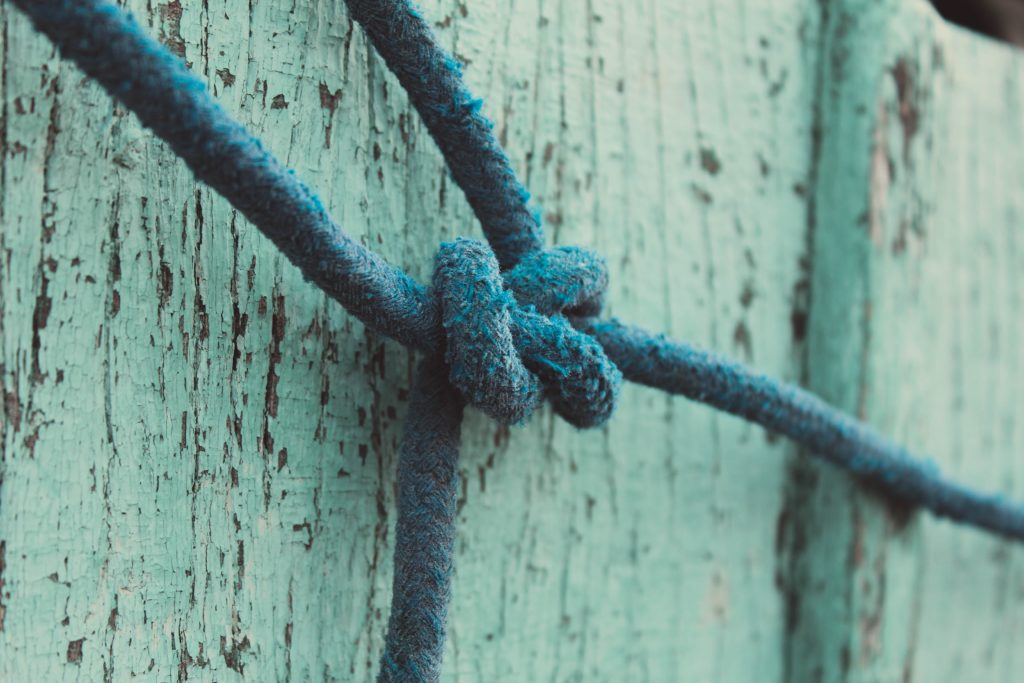
Untying Knots
by Chiemi Souen
Jiji’s garage, there,
under the house. The smell
of dirt, mold, moth
balls, and cat shit.
Fingers clinging to the chocolate-brown lattice
under the mint-green house.
Eyes see through the filtered sunlight.
See:
Cardboard boxes filled with old
photos and papers, empty
sake gallon
bottles, bamboo
fishing poles, throw
nets, old garden gloves,
rusty sickles, rubber boots,
tabis, old rice
bags, shoyu cans, empty milk
bottles, a wooden
washboard, and lots of glass
jars filled with nails
and screws.
Pilau cats scavenge
for geckos and oily, brown gokiburi.
The flapping of rubber
slippers descend
the stairs, Jiji comes
down into the garage.
Open the padlock on the hinged door under the house.
Crouch into the opening.
Tan bermuda shorts, white v-neck undershirt.
What is he looking for?
Move boxes with intention,
squat and dig
(no line break)
the dirt for something.
Pull a secret
from the ground, a wooden box
with a rope handle.
Place the box on the white
Kenmore washing machine.
Open the Price Busters
package,
take out a
small neon
green plastic
bucket white and
yellow flowers painted on it.
The kind
you put cotton
balls or coffee
candy inside.
The secret:
wrapped in a purple furoshiki, Jiji, pull it
out from the wooden box.
Place wrinkled earth-covered hands together, pray,
“Obaachan, now you can go home.” He lifts
his head and unties the knots,
uncovers an old rusty Hills Brothers coffee can.
Tilt the can, silver silty ashes
sliding into the plastic container.
Tears fall into the dust.
Wrap the new urn
with the purple furoshiki. Place
it in a brown paper bag.
Light a Marlboro, take a drag.
Stare out into the sky, watch the clouds, the clouds—
that’s where I wonder.
Jiji, now that you are gone.
You tell me,
I am so sorry.
I am so lucky.
I am so loved.
In a small space
within me,
I place
an old wooden
Corina Larks
cigar box,
a McDonald’s napkin
on which I write,
I forgive you,
a lucky kaeru charm,
and your black
jizo prayer beads.
Jiji, now you can
go home too.
END
About the Author
Chiemi Souen is a writer and poet born in Torrance, California and raised in Honolulu, Hawaii from the age of two. In 1995, she earned a bachelor’s degree in Japanese Language and Literature at the University of Hawai`i at Mānoa. In 1998, she received the Okinawa Prefectural Government Scholarship to attend the University of the Ryukyu where she studied Okinawan Language and Women’s Studies. Souen is also a member of Afuso Ryu Gensei Kai Hawai`i Shibu, an Okinawan classical music academy, and the Tamagusuku Ryu Frances Nakachi Ryubu Dojo, a Ryukyuan dance studio. After being diagnosed with Guillain-Barré syndrome in 2011 and discoid lupus in 2015 at the age of 43, Souen decided to leave her family’s accounting firm to be a full-time writer.
Souen’s work can be seen in the Hawai`i Herald, Hawai`i’s Japanese American Journal, and the Uchinanchu, a newsletter for the Hawai`i United Okinawa Association. She is also the stylish editor for the Seiwajyuku Journal, a quarterly business philosophy publication. Souen created a series of Writing for Wellness workshops aimed at addressing emotional healing. She was invited by the Sjögrens and Lupus Foundation of Hawai`i to conduct a workshop on the benefits of writing for emotional wellness for the past two years.
Souen writes poetry to give a voice to Okinawan-Americans of the 2nd, 3rd, and 4th generation descendants of contract sugar plantation workers who immigrated from Okinawa in the early 1900s and remain faceless in literature.
You must be logged in to post a comment.

+ There are no comments
Add yours